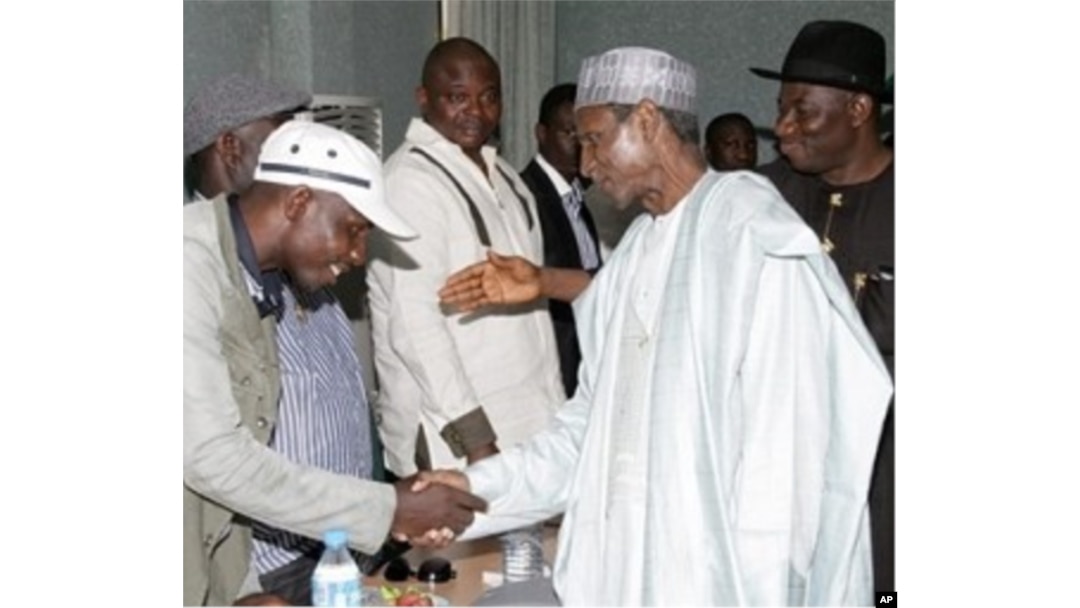For many Nigerians, Thursday’s swearing-in ceremonies for President Goodluck Jonathan restored some normalcy to what has been a highly erratic chapter in their struggle to perpetuate democratic rule. From the capital Abuja, human rights attorney Emmanuel Ogebe says Mr. Jonathan must overcome serious hurdles to secure his own candidacy for next year’s Nigeria presidential campaign.

President Yar'Adua (C), flanked by then-Vice President Goodluck Jonathan (R), shakes hands with Government Ekpemupolo (L), commander of rebel group MEND, during their meeting in Abuja on 09 October 2009.
“The first clear problem is who will be his vice president, and the constitution requires that he nominate a candidate who will be confirmed by the Senate – the National Assembly. The problem is like his cabinet, he might be held hostage by the governors, by the ruling party, or many other interests because he has to balance to pick a Muslim from the north,” said Ogebe.
President Umaru Yar’Adua’s lengthy medical decline may have helped prepare the nation for a relatively smooth transition without any street violence during yesterday’s funeral and inaugural ceremonies. But, it is not clear how long Mr. Jonathan, a southerner from the Niger Delta, will be able to assert party discipline within the ruling People’s Democratic Party (PDP).
Traditionally, the PDP has run on a consensus allowing power to alternate between northern leaders for two eight-year terms and then southern leaders. A Goodluck Jonathan second-term presidency would break that pattern, much to the disappointment of several northern PDP stalwarts who had backed President Yar’Adua, a former northern governor of Nigeria’s Katsina state. Emmanuel Ogebe says Mr. Jonathan has a 10 month timetable to line up his supporters and find a suitable second-in-command who will not undercut his own candidacy.
“He needs somebody who he can work with. Now if you foist someone on him that will have conflicts with him, then you are going to have a real succession problem, especially if the new vice president is interested in running (for president) in 11 months’ time,” he pointed out.
In President Jonathan’s favor, a recent visit to the United States allowed him to conclude an important binational treaty with the Obama administration and, upon his return home, he secured the ouster of Independent Electoral Commission Chairman Maurice Iwu, another move toward democratization that was recommended by officials in Washington.
In addition, Ogebe says Nigerians have finally found relief after being frustrated during the past few months by Mr. Yar’Adua’s closest advisers and family members, who they felt were not sharing their concerns about the President’s incapacitation to serve.
“I think that the arrowhead for the cabal who were playing the game of ‘The Wizard of Oz’ and cat-and-mouse with the Nigerian people has been dislodged. There were some members of that gang who were in the cabinet and who were kicked out. But, there were some who were not in the cabinet and who still continue to hold influence within the villa. I think those people will have to pack their bags and leave, and I think that the president [Mr. Jonathan] will actually have a lot more breathing space to clean house and move forward,” he said.
58-year-old Umaru Yar’Adua is not the first Nigerian leader to die in office, but he is the first democratically elected president whose term was cut short by death. Earlier departures included head of state General Murtala Mohammed, who enjoyed widespread popularity, but was assassinated in 1976, and military ruler General Sani Abacha, who died in office, reportedly of a heart attack at the age of 54 in 1998.

